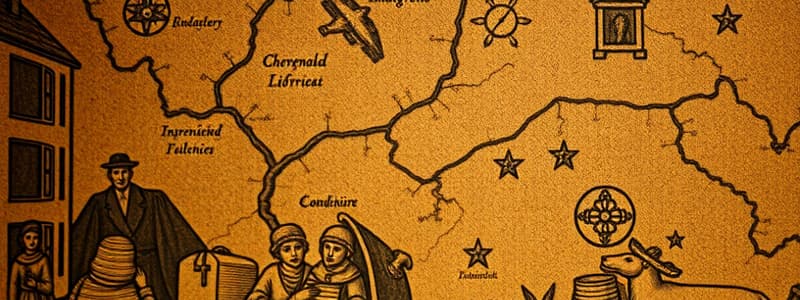Podcast
Questions and Answers
What is the primary focus of the study of history?
What is the primary focus of the study of history?
- Study of past events, societies, and cultures (correct)
- Analysis of modern technology
- Formation of future governments
- Development of scientific theories
Which of the following is NOT a type of historical source?
Which of the following is NOT a type of historical source?
- Primary Sources
- Digital Sources (correct)
- Secondary Sources
- Tertiary Sources
What does the term 'revisionist history' refer to?
What does the term 'revisionist history' refer to?
- Reinterpretation based on new evidence or perspectives (correct)
- History based on fictional narratives
- History written by only one perspective
- A chronological description of events
Which major historical period is characterized by the rise of religions and feudalism?
Which major historical period is characterized by the rise of religions and feudalism?
Who is considered the 'Father of History'?
Who is considered the 'Father of History'?
What major theme in history focuses on governance and revolutions?
What major theme in history focuses on governance and revolutions?
Which of the following best describes global history?
Which of the following best describes global history?
What era is characterized by events post-World War II, including globalization and modern conflicts?
What era is characterized by events post-World War II, including globalization and modern conflicts?
Flashcards are hidden until you start studying
Study Notes
Key Concepts in History
-
Definition of History
- Study of past events, societies, and cultures.
- Analysis of causes and effects of historical events.
-
Importance of History
- Understanding the present and informing future decisions.
- Preservation of cultural heritage and identity.
- Learning from past mistakes and achievements.
-
Historical Sources
- Primary Sources: Original documents (diaries, artifacts, recordings).
- Secondary Sources: Interpretations or analyses of primary sources (books, articles).
- Tertiary Sources: Summaries of primary and secondary sources (encyclopedias).
-
Historical Methodology
- Critical examination of sources.
- Contextualization: Placing events in their historical background.
- Chronology: Establishing timelines of events.
-
Major Historical Periods
- Prehistory: Before written records; relies on archaeology.
- Ancient History: Early civilizations (Mesopotamia, Egypt).
- Classical Era: Greek and Roman influence.
- Middle Ages: Feudalism, the rise of religions.
- Modern History: Renaissance, Enlightenment, Industrial Revolution.
-
Significant Themes in History
- Power and Politics: Governance, revolutions, empires.
- Culture and Society: Art, religion, social structures.
- Economics and Trade: Development of trade networks, capitalism.
- Conflict and Cooperation: Wars, treaties, diplomacy.
-
Influential Historians
- Herodotus: "Father of History," focused on narrative.
- Thucydides: Critical analysis and methodology.
- Karl Marx: Economic and social class theories.
- Fernand Braudel: Emphasis on geography and long-term structures.
-
Historical Interpretation
- Different perspectives (political, social, economic).
- Revisionist history: Reinterpretation based on new evidence or perspectives.
- Historiography: The study of how history has been written and understood over time.
-
Global History vs. National History
- Global History: Examines historical events across multiple regions.
- National History: Focus on the history of a specific nation or state.
-
Contemporary History
- Events post-World War II; focus on globalization, technology, and modern conflicts.
- Ongoing debate about all perspectives and events, such as colonialism, human rights, and environmental issues.
Conclusion
- History is a dynamic and evolving field, influenced by various perspectives and methodologies.
- Understanding history is crucial for informed citizenship and fostering a sense of identity.
Definition of History
- The study of the past, encompassing events, societies, and cultures.
- Examines the causes and effects of historical events.
Importance of History
- Provides insights into the present and informs future decisions.
- Preserves cultural heritage and identity.
- Allows us to learn from past mistakes and achievements.
Historical Sources
- Primary Sources: Direct evidence, including diaries, artifacts, and recordings.
- Secondary Sources: Interpretive analysis of primary sources, such as books and articles.
- Tertiary Sources: Summaries of primary and secondary sources, like encyclopedias.
Historical Methodology
- Critical evaluation of sources.
- Contextualization: Placing events within their historical context.
- Chronology: Establishing a timeline of events.
Major Historical Periods
- Prehistory: Before written records, relying on archaeological findings.
- Ancient History: Early civilizations, including Mesopotamia and Egypt.
- Classical Era: Marked by the influence of Greek and Roman civilizations.
- Middle Ages: Characterized by feudalism and the rise of religions.
- Modern History: Including the Renaissance, Enlightenment, and Industrial Revolution.
Significant Themes in History
- Power and Politics: Governance, revolutions, and empires.
- Culture and Society: Art, religion, and social structures.
- Economics and Trade: Development of trade networks and capitalism.
- Conflict and Cooperation: Wars, treaties, and diplomacy.
Influential Historians
- Herodotus: Known as the “Father of History,” focused on narrative historical accounts.
- Thucydides: Emphasized critical analysis and methodology in historical writing.
- Karl Marx: Developed theories related to economic and social class structures.
- Fernand Braudel: Focused on geography and long-term structures in historical analysis.
Historical Interpretation
- Different perspectives influence how history is understood, including political, social, and economic viewpoints.
- Revisionist history: Reinterpreting the past based on new evidence or perspectives.
- Historiography: Studying how history has been written and understood over time.
Global History vs. National History
- Global History: Examines historical events across multiple regions.
- National History: Focuses on the history of a specific nation or state.
Contemporary History
- Events post-World War II, focusing on globalization, technology, and modern conflicts.
- Ongoing debates about perspectives and events, such as colonialism, human rights, and environmental issues.
Conclusion
- History is a dynamic and evolving field, influenced by various perspectives and methodologies.
- Understanding history is essential for informed citizenship and fostering a sense of identity.
Studying That Suits You
Use AI to generate personalized quizzes and flashcards to suit your learning preferences.




